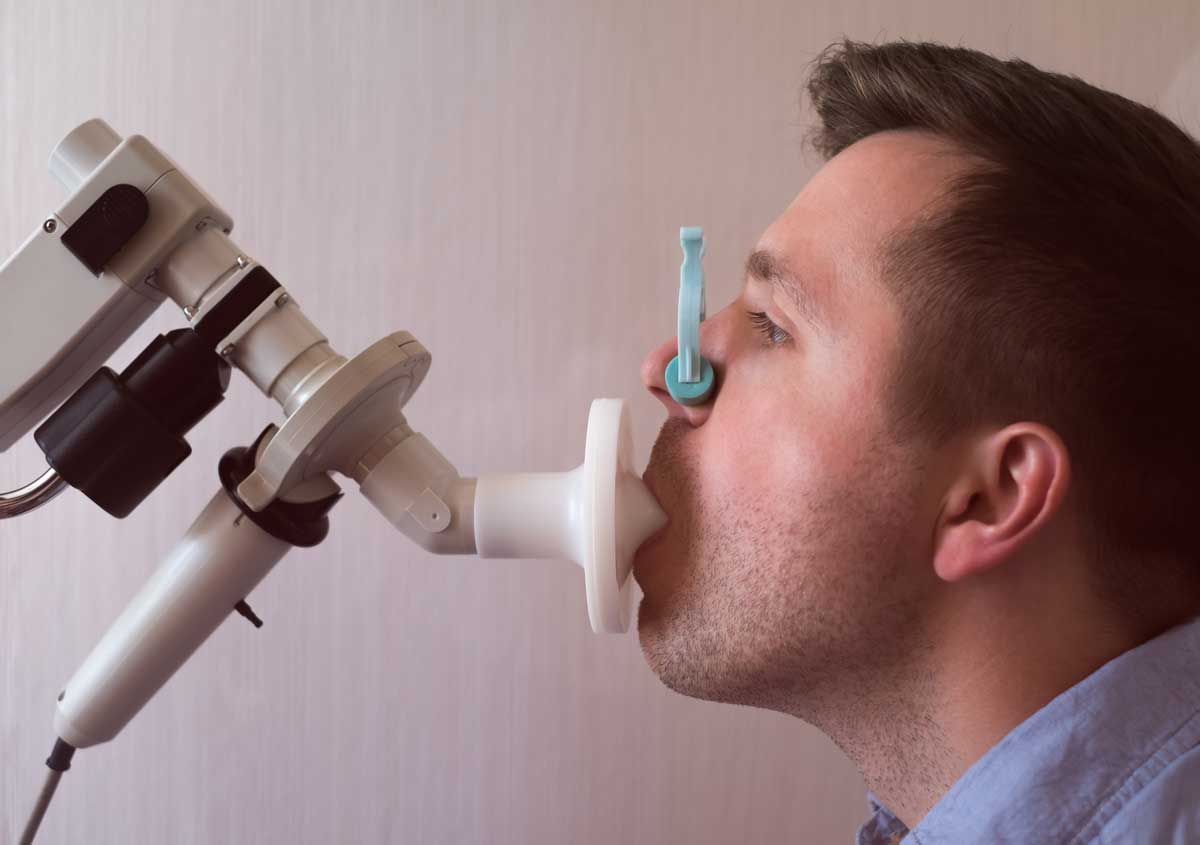
Allergies can affect the functionality of your respiratory system in many ways. If you experience coughing, wheezing, shortness of breath, or other breathing difficulties, they may be relieved by diagnosing and treating your allergies. Our offices at Advanced Allergy & Asthma Associates/Food Allergy Center of Illinois are equipped with the latest, most reliable technology for accurate diagnosis and treatment planning.
Our computerized lung function test, also called spirometry, can help us determine the nature and severity of your respiratory problems. The process is simple and comfortable. You only need to breathe into a sterile mouthpiece, which sends data to the spirometer (analytical machine). It accurately measures a number of functionality indicators including:
- FVC (forced vital capacity) is the volume of air you can exhale forcefully after deeply inhaling.
- FEV (forced expiratory volume) is the volume of air that you can forcefully exhale in a single breath.
- Forced expiratory flow is a measurement of airflow taken while exhaling.
- PEF (peak expiratory flow) is how fast you can exhale a deep breath.
- MVV (maximum voluntary ventilation) is a measurement of the maximum volume of air you are capable of inhaling and exhaling within a 60-second period.
- SVC (slow vital capacity) is the volume of air that you can exhale slowly after inhaling deeply.
- TLC (total lung capacity) is the maximum volume of air you are capable of inhaling.
- FRC (functional residual capacity) is the volume of air remaining in your lungs following normal exhalation.
- RV (residual volume) is the volume of air that remains in your lungs after exhaling as much as possible.
- ERV (expiratory reserve volume) is the difference between the volume of air remaining in your lungs after exhaling forcefully, and that remaining after exhaling normally.
Lung function testing at Advanced Allergy and Asthma Associates

My name is Dr. Noga Askenazi, and I work at Advanced Allergy and Asthma Associates.
We specialize in treating different respiratory issues that include asthma or symptoms like cough, shortness of breath, trouble exercising.
We’re fortunate because one of the tools that help us diagnose a respiratory issue or an underlying disease is a spirometry test.
What is a Spirometry Test?
It is a type of lung function testing that measures how an individual’s lungs work with breathing.
We usually spend quite a bit of time teaching our patients how to do the test.
We also do it with them and take the best out of several attempts blowing, and then we go over those results with our patients to explain what it is showing us about their lung function.
What issues can the lung function test identify?
Some lung function results will tell us the person is asthmatic or has something we may call COPD, possibly an underlying issue.
It may tell us the person has what we call a little bit of restriction in their lung function and explain the cause of that and what could improve that.
What are the benefits of lung function testing?
The benefit is that we can do it in the office. We have an excellent way of allowing people to blow and breathe air in and out safely.
So patients do not feel they are risking inhaling or blowing towards anyone or anything with a cold or virus.
The results are quite immediate, so we’re then able to treat the underlying issue so everyone feels they can improve their lung function and breathe better.
Afterwhich, we can always follow up with some lung function testing to see if the lung function has improved or changed, which helps guide our treatments.
Contact us today and schedule an appointment to get your lung function tested.
What is Spirometry?

Spirometry
Spirometry is a test of how well your lungs are working, by measuring how fast and how much air you can breathe in and out. Normally, as you breathe in, or inhale, air moves freely through your trachea, or windpipe, then through large tubes called bronchi, smaller tubes called bronchioles, and finally into tiny sacs called alveoli. Small blood vessels called capillaries surround your alveoli. Oxygen from the air you breathe passes into your capillaries. Then, carbon dioxide from your body passes out of your capillaries into your alveoli. Then, you get rid of the carbon dioxide when you breathe out or exhale. Diseases, such as COPD and asthma, restrict your bronchioles, reducing the amount of air going into your lungs. COPD also damages your alveoli, which may reduce the amount of oxygen in your blood. These diseases can make it hard for you to breathe. Your doctor may recommend a spirometry test, to identify a disease in your lungs or to check the severity of your existing lung disease. During the test, your caregiver will use a device called a spirometer. A spirometer is a machine that measures exhaled air. Before you take a spirometry test, you will sit in a comfortable chair with your feet flat on the floor. If you have dentures, you may be asked to remove them. For best results, you’ll be advised to follow your caregiver’s instructions exactly. To start, you will raise your head and chin so you can breathe easily. Next, you may place a clip on your nose to prevent air from coming out of your nostrils. Then, you will take a deep breath, filling your lungs completely with air and hold it. You will place the spirometer’s mouth piece between your teeth and tightly seal your lips around it. Finally, you will blast the air out of your lungs as hard and as fast as you can. Your caregiver will tell you when to stop. Adults typically blow for at least 6 seconds. You will need to perform the spirometry test correctly three times to get accurate results. Your doctor will discuss the results with you and let you know if you have any breathing problems.
This data enables us to evaluate your lung functioning and breathing abilities in detail, so that we can provide the appropriate treatment if needed. The respiratory disorders that can be detected with this test include:
- Emphysema
- Chronic cough
- Bronchitis
- Asthma
- More
If you have been experiencing breathing difficulties that may be allergy related, let the trained professionals at Advanced Allergy & Asthma Associates/Food Allergy Center of Illinois help! We have three convenient locations – Elgin and Crystal Lake – for easy access throughout the region. Call (847) 888-8802 and schedule your appointment today.

















